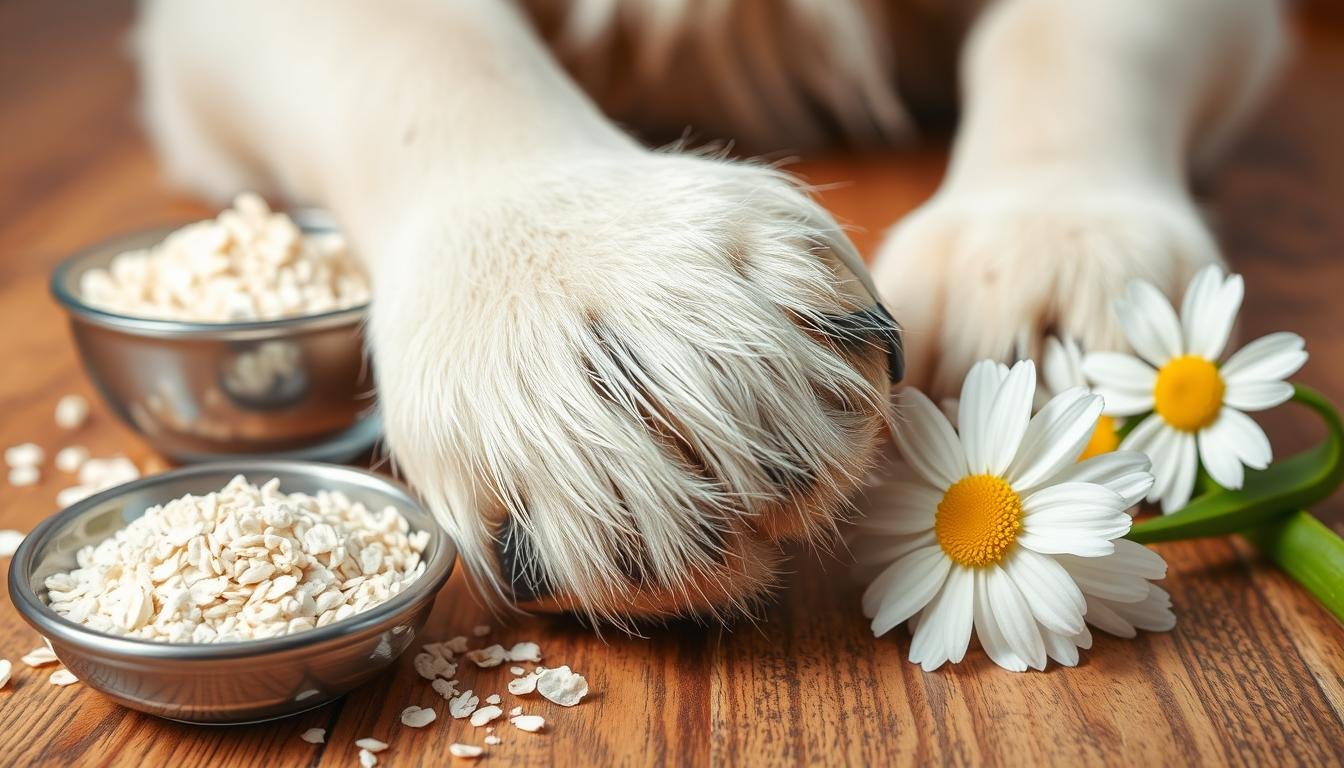As our beloved dogs get older, they often see changes in weight and appetite. Some may gain weight, while others lose it, even if they’re eating well. This weight loss in dogs can be a sign of serious health issues that need quick vet care.
Weight loss in older dogs can happen slowly or quickly. It’s important for owners to watch their dogs closely for any changes in weight, appetite, and behavior. While some weight changes are normal with age, losing 10% or more of body weight in a year is a big concern and needs vet attention.
There are many reasons why dogs might lose weight suddenly. These include eating less, not absorbing nutrients well, and health problems like kidney disease, liver issues, dental problems, and even cancer. Knowing the possible causes and watching for signs can help owners keep their senior dogs healthy.
Understanding Weight Loss in Senior Dogs
As dogs age, they can naturally lose weight. This might worry pet owners. It’s key to know the difference between normal weight changes and when to see a vet.
Natural Age-Related Weight Changes
Dogs often lose weight as they get older. This is due to several reasons like less appetite, slower metabolism, and muscle loss. Senior dogs need more calories and easy-to-digest proteins to keep their muscles.
When Weight Loss Becomes Concerning
Some weight loss in older dogs is normal. But, it can also signal health problems like cancer, diabetes, dehydration, or dental issues. If your dog loses 10% of its weight, get vet advice.
Signs to Watch For
- Changes in appetite, thirst, and urination patterns
- Reduced energy levels and activity
- Visible physical changes, such as a bony appearance or loose skin
Keep an eye on your senior dog’s body condition score. Regular vet visits are also key. They help catch health issues early, ensuring your dog gets the right care.
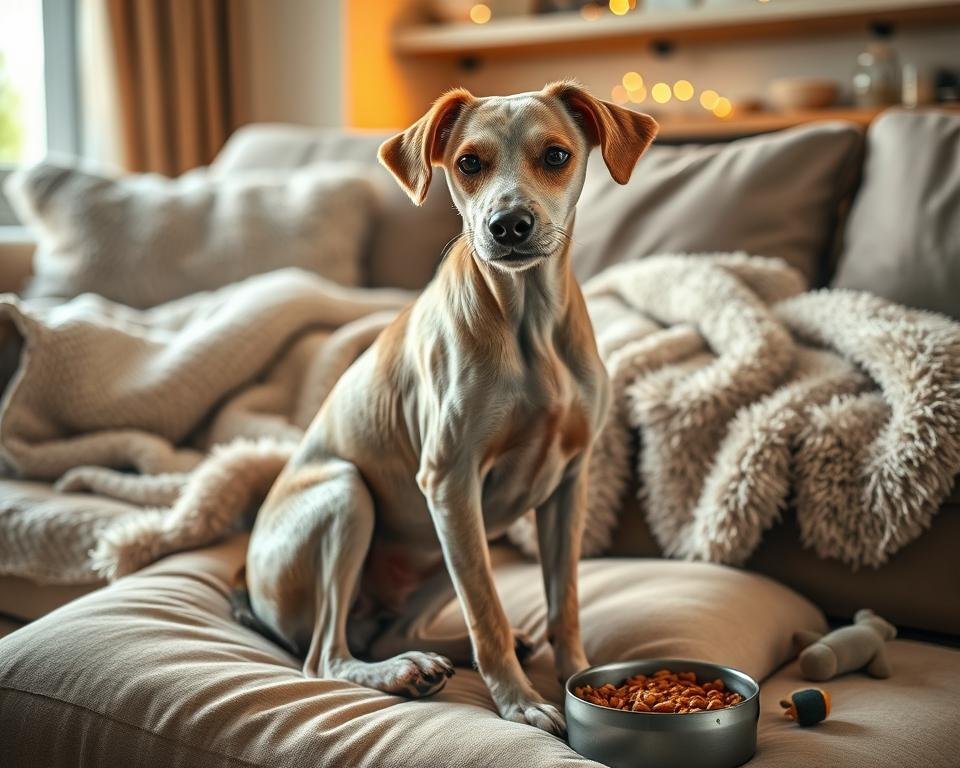
| Condition | Symptoms |
|---|---|
| Kidney Disease | Unexplained weight loss, increased thirst and urination |
| Liver Disease | Trouble digesting nutrients, abdominal pain, jaundice, increased thirst |
| Dental Problems | Bad breath, bloody saliva, difficulty chewing |
| Cancer | Vomiting, weight loss, pain, lethargy |
Regular vet visits and exams help track your senior dog’s health. This makes it easier to spot any unusual changes, like my dog is losing weight but eating normally.
Why Is My Senior Dog Losing Weight But Stil Eating
If your senior dog is losing weight but eats normally, there are many reasons why. Sudden loss of weight in dogs can be due to health issues. These can range from diet changes to serious medical problems.
Liver disease is a common cause. It makes it hard for dogs to digest and absorb nutrients. Maldigestion disorders, like inflammatory bowel disease, also cause dog losing weight. This is because the body can’t break down food well.
- Metabolic conditions like diabetes increase energy needs. This can lead to weight loss even with normal eating.
- Dental and digestive problems make eating painful. This can cause dogs to eat less and lose weight.
If your senior dog is losing weight without reason, see a vet. They can find the cause and help your dog stay healthy.
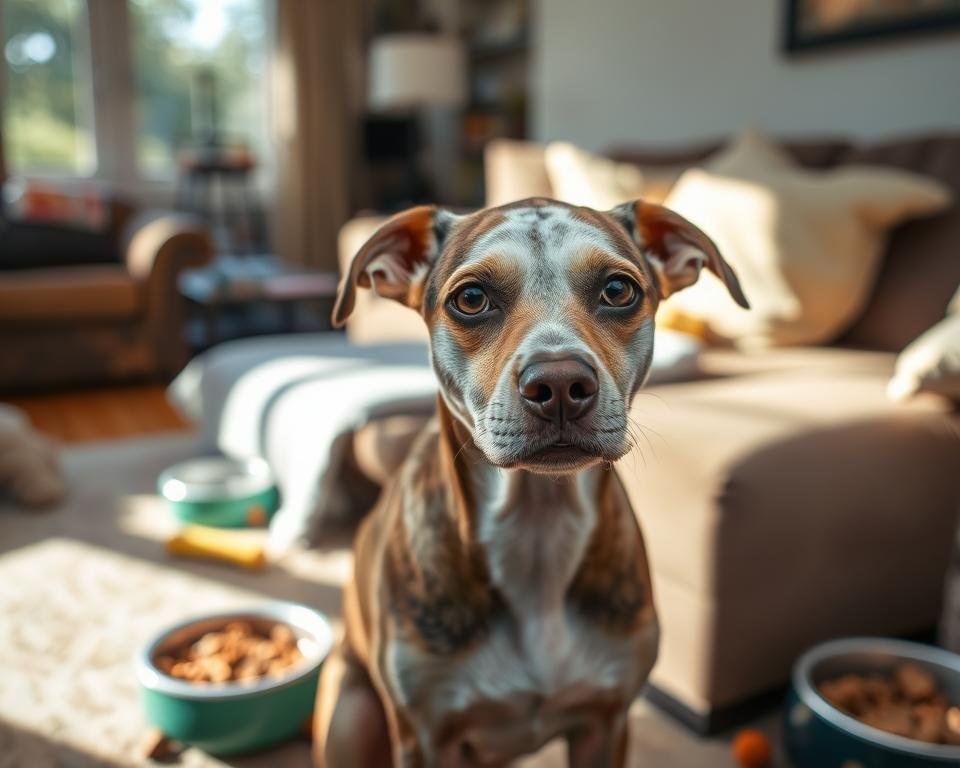
“Rapid significant weight loss in senior dogs requires prompt veterinary attention.”
Stay alert and work with your vet. This way, your senior dog can stay healthy and happy, even with age.
Common Health Conditions Causing Weight Loss in Older Dogs
As our beloved canine companions age, weight loss can become a concerning issue, even when they are eating normally. This weight loss may be a symptom of underlying health conditions that require prompt veterinary attention. Let’s explore some of the common health issues that can lead to weight loss in senior dogs.
Kidney and Liver Disease
Kidney disease can cause weight loss due to the buildup of toxins and electrolyte imbalances in the body. [https://healthdy.com/does-creatine-make-you-gain-weight/]Liver disease, on the other hand, can affect the proper processing of nutrients, leading to weight loss despite a normal appetite.
Dental Problems and Digestive Issues
Dental problems, such as painful gums or missing teeth, can make eating difficult for senior dogs. This results in reduced food intake and subsequent weight loss. Digestive issues like inflammatory bowel disease can also impair nutrient absorption, contributing to weight loss.
Cancer and Diabetes
Certain types of cancer and the onset of diabetes can cause metabolic changes in older dogs. This leads to weight loss even when their appetite remains normal or increases. Early detection and proper management of these conditions are critical for the well-being of senior dogs.
Veterinary intervention is essential if a senior dog loses 10% or more of their body weight within a year. Additional symptoms like changes in behavior, excessive whining, constipation, lethargy, loss of appetite, dry heaving, and diarrhea are also important indicators.
| Condition | Symptoms |
|---|---|
| Liver/Gallbladder Disease | Increased thirst, vomiting/diarrhea, yellowing of skin/eyes |
| Dental Issues | Excessive drooling, difficulty eating/chewing, swollen or bleeding gums |
| Kidney Disease | Increased thirst, excessive urination (possibly with blood), loss of appetite |
| Heart Disease | Chronic cough, exercise intolerance, restlessness |
| Diabetes | Excessive thirst, increased appetite, repeated urinary tract infections |
| Cancer | Lethargy, unusual bleeding, lumps/swelling |
| Arthritis | Lameness, scuffing the toes, incontinence |
If your senior dog is losing weight but eating normally, it’s vital to consult with a veterinarian. Early detection and proper management can significantly improve the quality of life for our aging canine companions.
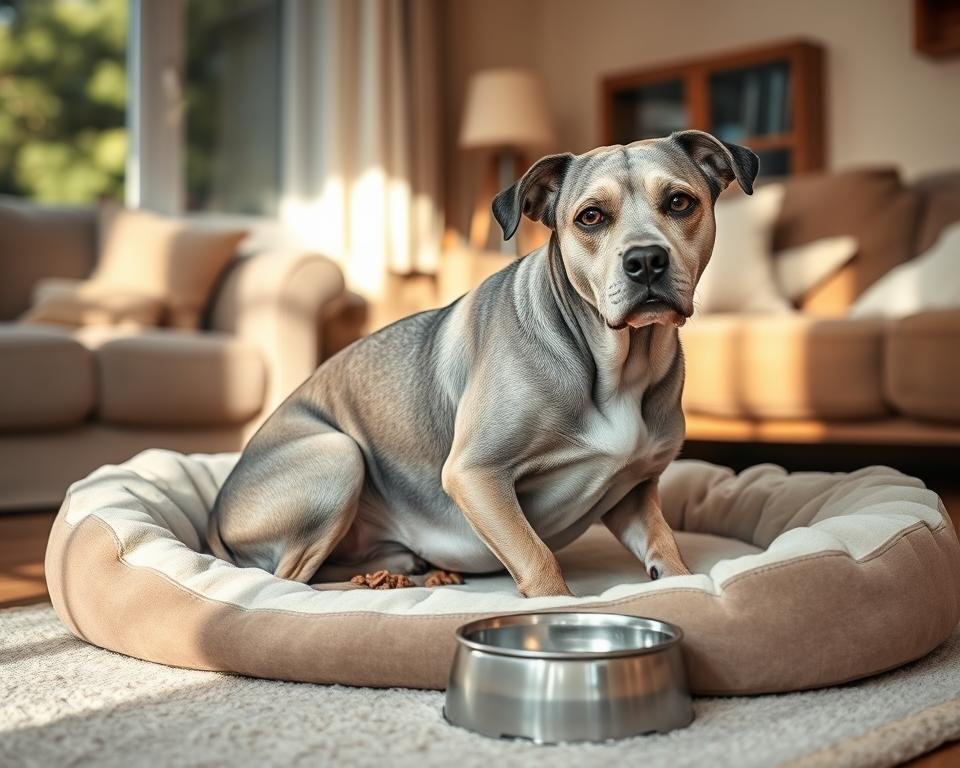
Signs of Serious Health Issues in Senior Dogs
As our canine friends age, it’s key to watch for signs of serious health problems. These can show up as sudden weight loss in senior dogs. Look out for:
- Changes in behavior, such as increased stress or excessive pacing
- Excessive thirst or urination
- Lethargy and fatigue
- Vomiting or diarrhea
- Difficulty eating or loss of appetite
- Bad breath, pale or yellow gums
- Coughing or unusual lumps and bumps
These symptoms can point to serious issues like kidney disease, liver disease, cancer, diabetes, or heart disease. It’s vital to get your old dog getting skinny to the vet quickly. This is because these signs might mean a serious health problem.
“Symptom management and observation are key in figuring out why senior dogs lose weight. This helps vets make the right diagnosis.”
Regular vet visits and keeping an eye on your senior dog’s health are important. They help spot any changes early. This way, you can get the right treatment fast. By being alert and working with your vet, you can make sure your dog has a happy, healthy golden age.
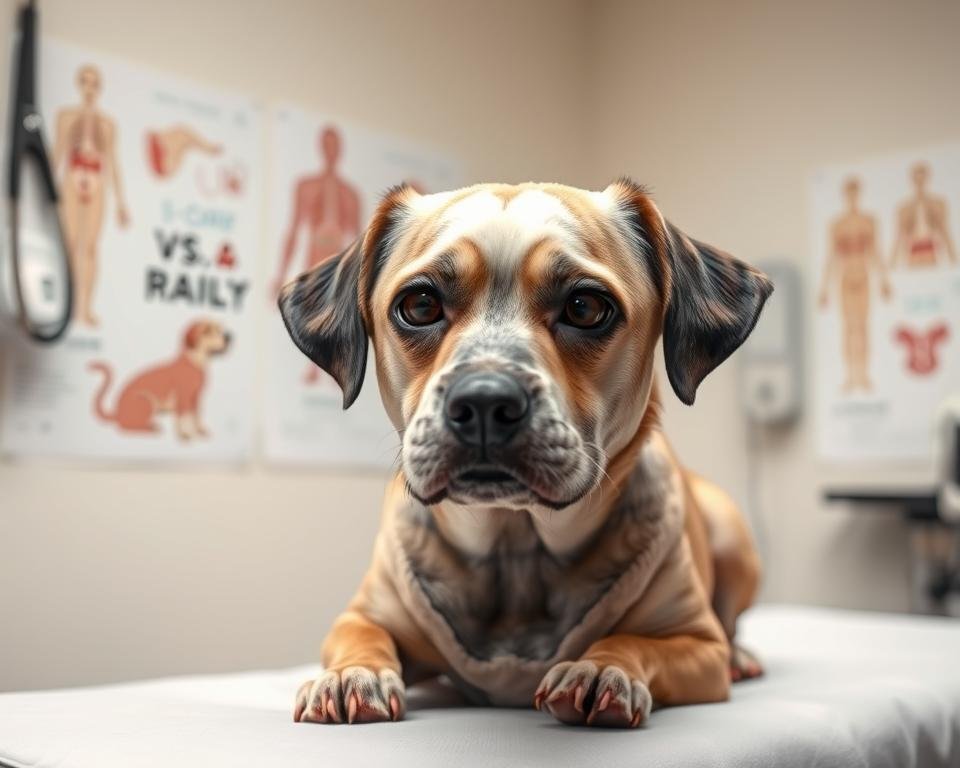
Nutrition and Diet Considerations for Weight Management
As dogs get older, keeping them at a healthy weight is tough. Senior dogs need a diet full of high-quality, easy-to-digest protein. This helps keep their muscles strong. They also need the right amount of fats for energy and to help use protein well.
Proper Protein and Fat Balance
As dogs age, their diet needs change. Vets can figure out how many calories they need and suggest special dog food. This food is made for older dogs and helps with weight management and health issues.
Caloric Requirements for Senior Dogs
Watching a senior dog’s weight loss is key. Small changes, like eating more often or eating protein-rich foods, can help. Working with a vet ensures the dog gets the right food for their health and happiness.
FAQ
What is normal weight loss in senior dogs?
Senior dogs naturally lose weight as they age. But, losing 10% or more of their body weight is a red flag. This weight loss can be due to less appetite, slower metabolism, and muscle loss.
When does weight loss become concerning in senior dogs?
Weight loss is a concern if it’s sudden or too much. Look out for changes in appetite, thirst, and energy. Regular vet visits help catch health problems early.
Why is my senior dog losing weight but eating normally?
Many reasons can cause weight loss in senior dogs, even if they eat well. These include diet changes, liver disease, and diabetes. A vet can help find the cause and suggest treatment.
What health conditions can cause weight loss in older dogs?
Kidney and liver disease, dental issues, and digestive problems can lead to weight loss. Cancer and diabetes are also culprits. Each needs its own treatment plan.
What are the signs of serious health issues in senior dogs?
Look out for sudden weight loss, changes in behavior, and excessive thirst or urination. Also, watch for lethargy, vomiting, and bad breath. If you see these signs, get your dog to the vet fast.
How should I manage my senior dog’s diet for weight management?
Senior dogs need a diet rich in high-quality protein to keep muscles strong. The right amount of fat is also key. As they age, their diet needs may change. A vet can help find the right food for your dog.



